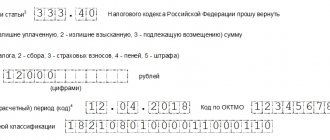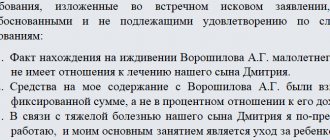When leaving a statement of claim without progress, you need to familiarize yourself with the reasons for abandonment. One of the reasons may be that the claim was filed incorrectly or the documents specified in the law were not attached. These reasons can be eliminated by submitting documents to the court or by correcting the statement of claim within the period specified in the determination. Sometimes the courts may make an erroneous ruling; in this case, you can file a complaint against the court ruling.
USEFUL : watch the video on the issue of leaving a claim without progress or returning a statement of claim, write your question in the comments of the video
Grounds for leaving the claim without progress
Filing a claim with the court entails certain actions, for example, the claim can be accepted, returned, left without progress, or refused to accept the claim. Leaving the claim without progress means that there will be no further progress in the case until the shortcomings are eliminated, for example, the person filed the claim in the wrong form or did not attach the necessary documents. The claim may be dismissed for the following reasons:
- The application does not correspond to the form or the content of the claim is incorrect (for example, the names of persons are not indicated, the circumstances or requirements are incorrectly stated, the price of the claim, if any, is not established);
- The statement of claim has not been signed . At the same time, this rule also concerns the fact that the presence of a signature in itself can also become a reason for leaving without movement, for example, if the signature is of a person whom the Plaintiff has not authorized to sign and file a claim in court (there is no power of attorney in the application of the claim or authority in the submitted a power of attorney is not enough);
- There is no calculation of the claim price . So, if a party’s demand consists of summing numbers or applying subtraction rules, then the calculation that was made must be attached on a separate sheet. You are required to comply with this rule even if you indicate calculations in the text of the claim itself, since this defect may become a formal violation of procedural law and will lead to loss of time for correction in the future.
- No claim - when it is necessary to comply with the claim procedure. Therefore, check whether you have sent a request to the party to voluntarily resolve the dispute. After all, even if the court overlooks this defect, it may subsequently lead to more disastrous consequences in the form of leaving the statement of claim without consideration (more details at the link).
- The application is not accompanied by basic documents (for example, a receipt for payment of the state duty, copies of the number of persons participating in the case, documents on which the plaintiff bases his claims). It is important to know that civil procedural legislation provides for collecting a set of all documents attached to the application according to the number of persons participating in the case, that is, for example, if there are 2 defendants, then prepare 1 set for the court and 2 sets for the defendant. There is no need to send a copy of the application and documents to the defendant; the judicial authorities of general jurisdiction themselves transfer the documents to them (in arbitration courts, the responsibility lies with the Claimant, who provides proof of sending all materials to the parties).
In connection with the procedural reform, namely the creation of cassation and appeal courts, very important changes are being made to the codes. Changes are also made regarding leaving a statement of claim without progress, for example:
The new version will provide for attaching a receipt (notification) of delivery to persons of a copy of the statement of claim and documents (this process is now provided for in the arbitration process), that is, in fact, copies of the statement and documents will not need to be attached, the law only specifies the attachment of documents that the defendants do not have and third parties.
The changes also affected the application form, for example, the word “location” was replaced by the word “address”, that is, the plaintiff indicates his address (actual or legal), and not where it is located. Information about the defendant will need to be indicated in more detail, both an individual and a legal entity, for example, passport information, INN, OGRN, driver's license. Changes have also been made regarding compliance with pre-trial procedures (filing a claim); this rule will be provided for by law, not by contract.
USEFUL : watch the VIDEO on the rules for drawing up a statement of claim in court, so as not to get into the situation of identifying shortcomings, write your question to the lawyer in the comments of the video
Analytics Publications
In the theory of civil procedure, a distinction is traditionally made between the procedural right to claim (the right to sue) and the right to claim in the substantive sense (the right to satisfaction of the claim).
The absence of such general prerequisites for the procedural right to claim, such as the jurisdiction of the dispute by a court of general jurisdiction or an arbitration court and the absence of a judicial act that has entered into legal force or an arbitration court decision on an identical dispute that has become binding on the parties, is grounds for termination of proceedings in the case (Article 150 of the Arbitration Procedure Code of the Russian Federation , Article 220 of the Code of Civil Procedure of the Russian Federation). The court of general jurisdiction, having established the absence of such general prerequisites for the procedural right to claim, in accordance with Art. 134 of the Code of Civil Procedure of the Russian Federation, refuses to accept the statement of claim. The Arbitration Procedure Code of the Russian Federation does not provide for refusal to accept a statement of claim.
The plaintiff’s lack of procedural legal personality, the representative’s lack of authority to sign the statement of claim and present it to the court, or failure to comply with the mandatory pre-trial dispute resolution procedure provided for by law or agreement of the parties is grounds for leaving the statement of claim without consideration (Article 148 of the Arbitration Procedure Code of the Russian Federation, Article 222 of the Code of Civil Procedure RF).
Failure by the plaintiff to comply with the requirements for the form and content of the statement of claim is grounds for leaving the statement of claim without progress (Article 136 of the Code of Civil Procedure of the Russian Federation, Article 128 of the Arbitration Procedure Code of the Russian Federation). If the plaintiff does not correct such shortcomings within the period established by the court, the statement of claim must be returned on the basis of Art. 135 Code of Civil Procedure of the Russian Federation, Art. 129 Arbitration Procedure Code of the Russian Federation.
The return of the statement of claim, as well as leaving the statement of claim without consideration, does not prevent the plaintiff from re-applying to the court with an identical claim when the circumstances that served as the basis for this are eliminated (part 6 of article 129, part 3 of article 149 of the Arbitration Procedure Code of the Russian Federation, Part 3 of Article 135, Part 2 of Article 223 of the Code of Civil Procedure of the Russian Federation).
The court checks whether the plaintiff has a substantive right to claim during the trial and evaluates it when making a decision on the merits of the stated claims (Part 1 of Article 168 of the Code of Arbitration Procedure of the Russian Federation, Part 1 of Article 196 of the Code of Civil Procedure of the Russian Federation). The presence of a judicial act that has entered into legal force, which resolves the claim of the plaintiff, filed against a specific defendant on a specific subject and on a specific basis, excludes the possibility of subsequent filing of an identical claim (Clause 1, Part 1, Article 150 of the Arbitration Procedure Code of the Russian Federation, Article 220 of the Code of Civil Procedure of the Russian Federation ).
In judicial practice, situations arise when the basis for refusing to satisfy a claim is its premature presentation. An example would be filing a claim to collect a debt before the payment is due, filing a claim to recognize a right before the conditions with which the law connects its occurrence, etc. In this case, does the plaintiff lose the right to subsequently go to court? Current practice does not yet provide a clear answer to this question. Below we will look at several situations in which plaintiffs most often make mistakes when filing a claim in court.
Presentation of a demand for recognition of the right to unauthorized construction in the absence of conditions for satisfying such a claim
Paragraph 3 of Article 222 of the Civil Code of the Russian Federation allows for the possibility of recognizing the right of ownership of an unauthorized building to the owner of the land plot on which the building is located. At the same time, according to the clarifications of the Supreme Court of the Russian Federation and the Supreme Arbitration Court of the Russian Federation, when considering claims for recognition of ownership of an unauthorized construction, the courts must check whether the person who created the unauthorized construction has taken appropriate measures to legalize it, in particular to obtain a permit for construction and/or commissioning of the facility into operation. Ownership of an unauthorized structure erected without the necessary permits cannot be recognized by the person who created it, who had the opportunity to obtain these permits, but did not take measures to obtain them[1].
Practice.
The company filed a claim with the arbitration court for recognition under Art. 222 of the Civil Code of the Russian Federation, ownership rights to the warehouse building. The courts of first and appellate instances rejected the claim. They explained this by the fact that the demands stated by the plaintiff were actually aimed at replacing the administrative procedure established by law for obtaining permission to build a property with a judicial procedure for recognizing ownership rights. The courts found that the plaintiff did not submit an application to the authorized body for a construction permit with the necessary package of documents attached or an application for putting a capital construction project into operation and did not prove that he had taken appropriate measures to legalize the unauthorized construction (to obtain a construction permit and/or act of putting the facility into operation). After this, the company took measures to legalize the building administratively by contacting the authorized body, and then, having failed to achieve the desired result, filed a new claim in court for recognition of ownership rights on the basis of the same article. 222 of the Civil Code of the Russian Federation. The arbitration court recognized this claim as identical to the previously stated one and terminated the proceedings. The higher courts also supported him. The courts rejected the plaintiff’s reference to the fact that an application for permission to legalize disputed objects is a new independent cause of action, different from the cause of action in the previously considered case, since new evidence does not indicate a change in the basis of the stated claim (resolution of the Federal Antimonopoly Service of the Volga-Vyatka District dated March 27 .2014 in case No. A39-2527/2013).
In another case, an entrepreneur applied to the arbitration court with a claim for recognition on the basis of Art. 222 of the Civil Code of the Russian Federation, ownership of the store building. The court refused to satisfy the request. He referred to the fact that the reconstruction of the building was carried out by the plaintiff without a construction permit, and the store building itself is located in the area of the high-pressure gas distribution pipeline, which violates the rights and legally protected interests of other persons and creates a threat to the life and health of citizens (decision of the Arbitration Court of the Vladimir Region dated December 6, 2014 in case No. A11-5959/2012). After this, the entrepreneur dismantled the corner of the building in order to comply with the gas pipeline security zone and filed a new lawsuit in court under Art. 222 of the Civil Code of the Russian Federation on the recognition of ownership of the store building. The arbitration court recognized the new claim as identical to the previously stated one, and terminated the proceedings on the basis of clause 2 of part 1 of Art. 150 Arbitration Procedure Code of the Russian Federation. The appeal was supported by the trial court, but the district court did not agree with them. He indicated that the building about which the dispute is being considered in this case has other individually defined characteristics, in particular regarding the area of the property, compared to those that it had at the time of consideration of case No. A11-5959/2012. In addition, the district court noted that since another, extrajudicial procedure for recognizing the right of ownership of unauthorized buildings is not provided for by law, the issue of the entrepreneur’s ownership of the real estate object erected by him can be resolved only based on the results of consideration of the claim filed by him. Thus, in the opinion of the cassation court, the plaintiff chose the only possible way to protect his rights to the disputed building, but this circumstance was not taken into account by the arbitration courts.
A similar approach was applied by the FAS of the East Siberian District when issuing a resolution dated July 4, 2014 in case No. A33-23476/2013. In this case, the cassation court did not agree that the plaintiff’s demand for recognition of ownership of unauthorized reconstructed buildings, presented after the elimination of violations of fire safety standards, is identical to the previously stated requirement, the satisfaction of which was refused on the basis of the presence of these violations.
Filing a claim for the return of the advance paid under the contract before termination of the contract
Upon termination of the contract, the party that paid the advance has the right to demand its full or partial return if the other party has unjustly enriched itself (clause 1 of the information letter of the Presidium of the Supreme Arbitration Court of the Russian Federation dated January 11, 2000 No. 49 “Review of the practice of considering disputes related to the application of the rules on unjust enrichment"). Similar explanations are contained in the Resolution of the Plenum of the Supreme Arbitration Court of the Russian Federation dated June 6, 2014 No. 35 “On the consequences of termination of the contract.”
The following case can be cited as a good illustration. A construction subcontract agreement was concluded between the general contractor and the subcontractor, under the terms of which the subcontractor agreed to carry out construction work, and the general contractor agreed to accept and pay for the results. During the execution of the contract, disagreements arose between the parties: the subcontractor referred to insufficient funding, the general contractor – to a significant lag behind the work schedule. As a result, construction work was suspended, and the general contractor filed a lawsuit to recover the unpaid advance payment from the subcontractor. The arbitration court declared the subcontract agreement terminated (clause 3 of Article 450 of the Civil Code of the Russian Federation) due to the unilateral refusal of the general contractor to fulfill the contract on the basis provided for in clause 2 of Art. 715 of the Civil Code of the Russian Federation, and satisfied the stated claims for recovery of the unearned advance payment (decision dated January 17, 2013 in case No. A73-14249/2012). The Court of Appeal did not agree with these conclusions, overturned the decision of the trial court and refused to satisfy the claim. The Court of Appeal found that the deadline for completing the work on the projects had not arrived, the delay from the schedule was not due to the fault of the subcontractor, the parties did not reach an agreement to terminate the subcontract agreement, due to a unilateral refusal to fulfill obligations, the contract was not terminated and is valid, therefore the grounds for recovery There are no unpaid advances from the subcontractor.
In this regard, the general contractor sent the subcontractor a notice of unilateral refusal to fulfill the subcontract agreement and filed a new claim in court to recover the unpaid advance payment. The court upheld the claim of the general contractor (decision of the Arbitration Court of the Khabarovsk Territory dated August 22, 2013 in case No. A73-7975/2013). The higher authorities upheld this decision.
The courts assessed the defendant’s argument about the identity of the plaintiff’s claims stated in case No. A73-7975/2013 with those previously stated in case No. A73-14249/2012. They came to the conclusion that in this case the plaintiff’s demands were justified by another circumstance - a unilateral refusal to fulfill the contract in accordance with Art. 717 of the Civil Code of the Russian Federation, therefore, provided for in clause 2, part 1, art. 150 of the Arbitration Procedure Code of the Russian Federation there are no grounds for termination of proceedings in the case.
The opposite approach was applied by the Federal Antimonopoly Service of the North-Western District (resolution dated January 31, 2012 in case No. A56-6688/2011).
Initially, the customer filed a claim in court to recover the unpaid advance payment from the contractor in the framework of case No. A56-46606/2008. In support of the stated demands, the plaintiff referred to the notice sent to the defendant about unilateral refusal of the contract (Clause 3 of Article 723 of the Civil Code of the Russian Federation) due to the fact that the contractor had not eliminated the identified deficiencies in the work. The arbitration court came to the conclusion that the plaintiff did not provide indisputable evidence of the presence of defects, therefore the right to unilateral refusal of the contract on the basis of clause 3 of Art. 723 of the Civil Code of the Russian Federation was not available to the customer. The court took into account that the contract itself did not provide for the possibility of its unilateral termination, and no agreement to terminate the contract was concluded between the parties. Therefore, the court recognized the contract as valid and refused to satisfy the customer’s request to recover the unearned advance payment as unjust enrichment. The higher authorities left the decision in this part unchanged (resolution of the Federal Antimonopoly Service of the North-Western District dated March 30, 2010 in case No. A56-46606/2008).
After considering this case, the customer sent the contractor a notice of unilateral refusal of the contract and again filed a claim for the return of the unpaid advance payment. However, the court terminated the proceedings on this request on the basis of paragraph 2 of part 1 of Art. 150 Arbitration Procedure Code of the Russian Federation. The court indicated that the notice of unilateral refusal of the contract indicated the same circumstances as the previously sent one, which was already assessed by the court when considering case No. A56-46606/2008, therefore the stated claim for the return of the prepayment amount is not subject to consideration on the merits. The courts of appeal and cassation upheld the decision. The panel of judges of the Supreme Arbitration Court of the Russian Federation refused to transfer the case to the Presidium of the Supreme Arbitration Court of the Russian Federation (decision dated April 12, 2012, case No. A56-6688/2011).
Filing a claim for debt collection before the occurrence of conditions with which the law associates the emergence of an obligation to pay
Under a work contract, one party (contractor) undertakes to perform certain work on the instructions of the other party (customer) and deliver its result to the customer, and the customer undertakes to accept the result of the work and pay for it (Clause 1, Article 702 of the Civil Code of the Russian Federation). In a similar way, the subject of the agreement is defined in paragraph 1 of Art. 740 of the Civil Code of the Russian Federation in relation to a construction contract and clause 2 of Art. 763 of the Civil Code of the Russian Federation in relation to a contract for the performance of work for state or municipal needs.
The Presidium of the Supreme Arbitration Court of the Russian Federation in paragraph 8 of the Review of the practice of resolving disputes under construction contracts (Information letter No. 51 dated January 24, 2000) explained that the basis for the customer’s obligation to pay for work performed is the delivery of the result of the work to the customer.
The contractor’s obligation to notify the customer about the readiness of the result of the work performed under the construction contract (or, if provided for in the contract, the completed stage of work) follows from clause 1 of Art. 753 of the Civil Code of the Russian Federation. Fulfillment by the contractor of this obligation entails the obligation for the customer, who has received the corresponding notice, to immediately begin accepting the result of the work performed. As a general rule, in paragraph 2 of Art. 753 of the Civil Code of the Russian Federation provides that the customer organizes and accepts the result of the work at his own expense, unless otherwise provided by the construction contract.
The delivery of the work result by the contractor and its acceptance by the customer are formalized by an act signed by both parties. If one of the parties refuses to sign the act, a note about this is made in it, and the act is signed by the other party (clause 4 of Article 753 of the Civil Code of the Russian Federation).
Subsequently, the Presidium of the Supreme Arbitration Court of the Russian Federation repeatedly confirmed the interpretation of the norms of civil law on contracts set out in paragraph 8 of Information Letter dated January 24, 2000 No. 51 (resolutions dated March 9, 2011 No. 13765/10; dated July 27, 2011 No. 2918/11; dated March 27, 2012 No. 12888/11; dated July 23, 2013 No. 4030/13). The Supreme Arbitration Court of the Russian Federation noted that the risk of failure to fulfill the obligation to organize and accept the result of work is borne by default by the customer, and therefore the customer’s evasion of acceptance of the result of work should not exempt him from paying for it (Resolution dated December 3, 2013 No. 10147/13).
Practice.
The contractor filed a claim with the customer in the arbitration court to collect the debt for payment for the work performed. Having established that the work was carried out with significant deficiencies requiring correction, the arbitration court refused to satisfy the stated requirements. Refusing the claim for debt collection, the court also indicated that the acceptance certificates submitted by the plaintiff to substantiate the stated requirements reflect only intermediate results of work and, if the transfer of a completed construction project to the customer is not proven, cannot serve as the basis for making a final settlement under the contract (decision of the Arbitration Court of the Kostroma Region dated 08/15/2008 in case No. A31-726/2008). Higher courts agreed with this position. Subsequently, the contractor eliminated the identified deficiencies and re-submitted to the customer a demand for payment for the work performed. This time the courts satisfied the stated demands. At the same time, they rejected the customer’s argument about the identity of the claims previously stated in case No. A31-726/2008 and formulated the conclusion that there were no grounds for terminating the proceedings on the basis of paragraph 2 of part 1 of Art. 150 of the Arbitration Procedure Code of the Russian Federation, the cassation court indicated that the grounds for presenting claims in these cases are different (resolution of the Federal Antimonopoly Service of the Volga-Vyatka District dated November 30, 2010 in case No. A31-2808/2009).
In another case, the contractor company applied to the arbitration court with a demand to collect from the customer the debt for payment for work performed on the installation of a ventilation system. The court refused to satisfy the claim on the grounds that the plaintiff did not notify the customer that the result of the work was ready for acceptance and did not submit the result of the work performed according to the act in accordance with Article 753 of the Civil Code of the Russian Federation (decision of the Arbitration Court of the Republic of Buryatia dated December 14, 2010 in case No. A10-4158 /2010). After this, the contractor sent the customer a notification about the readiness of the work result and offered to sign the acceptance certificate attached to it, and after refusal, he went to court with a demand for debt collection on the basis of a unilateral act. The courts satisfied the contractor's demands (resolution of the Federal Antimonopoly Service of the East Siberian District dated March 14, 2012 in case No. A10-4975/2010).
The Presidium of the Supreme Arbitration Court of the Russian Federation, however, did not agree with the position of the lower courts. He canceled the acts adopted in the case and terminated the proceedings on the basis of clause 2 of part 1 of Art. 150 of the Arbitration Procedure Code of the Russian Federation, considering the claim stated by the plaintiff to be identical to that considered earlier. Subject to the provisions of Art. 740 and 746 of the Civil Code of the Russian Federation, the Presidium of the Supreme Arbitration Court of the Russian Federation concluded that the basis for the claim for the collection of debt under the contract or the legal facts underlying both cases are the facts of the emergence of a contractual obligation and the performance of the relevant work, and not the acts of their delivery and acceptance. The new acceptance certificate for completed work, in the opinion of the Presidium of the Supreme Arbitration Court of the Russian Federation, was only new evidence of the same legal fact (delivery of the result of completed work to the customer), while the presence of new evidence and the circumstances associated with its receipt do not indicate a change grounds of claim.
New circumstances give the plaintiff a chance to reconsider the claims
As the Constitutional Court of the Russian Federation has repeatedly noted, the provisions of paragraph 2 of Part 1 of Art. 150 of the Arbitration Procedure Code of the Russian Federation are aimed at preventing the courts from considering identical claims (between the same parties, on the same subject and on the same grounds). However, the termination of the proceedings in accordance with clause 2 of part 1 of Art. 150 of the Arbitration Procedure Code of the Russian Federation is permissible only in cases where the right to judicial protection (the right to judicial consideration of a dispute) was exercised in a previously held trial on the basis of the principles of equality and adversarial rights of the parties (definitions of the Constitutional Court of the Russian Federation dated May 28, 2013 No. 771-O, dated March 22. 2011 No. 319-О-О, dated 02/25/2010 No. 236-О-О).
Therefore, if, during the consideration of the initial case, the plaintiff did not prove the circumstances to which he referred in support of his claims, and then, having received new evidence of the same facts that were already the subject of judicial research, he again stated his claims, the proceedings in the case should be terminated on the basis of clause 2, part 1, art. 150 of the Arbitration Procedure Code of the Russian Federation (or Article 220 of the Code of Civil Procedure of the Russian Federation, if the case is being considered by a court of general jurisdiction). A different approach will significantly infringe on the interests of the defendant and constitute a violation of the principle of adversarial proceedings, enshrined in Part 3 of Art. 123 of the Constitution of the Russian Federation.
If, when considering the case, the plaintiff did not refer to any of the circumstances relevant to the case, due to the fact that he did not and could not know about these circumstances, and the court did not investigate these circumstances, the case may be reviewed by the court that made the decision, according to newly discovered circumstances in the order of Ch. 37 Arbitration Procedure Code of the Russian Federation or Ch. 42 Code of Civil Procedure of the Russian Federation.
If circumstances that are important for resolving the issue of satisfying the plaintiff’s material claim arose after the case was resolved by the court on the merits, such circumstances may be the basis for filing a new claim. This is, in particular, indicated in paragraph 4 of the resolution of the Plenum of the Supreme Arbitration Court of the Russian Federation dated June 30, 2011 No. 52 “On the application of the provisions of the Arbitration Procedure Code of the Russian Federation when revising judicial acts based on new or newly discovered circumstances.” Proceedings on such a claim cannot be terminated on the basis of clause 2, part 1, art. 150 of the Arbitration Procedure Code of the Russian Federation, even if the subject matter and legal basis of the claim are identical. This means that when making a new claim, the plaintiff may well refer to the same rules of law that he asked to apply when initially filing a lawsuit. After all, the factual basis of the new claim will be different from the factual basis of the original claim, since the circumstances that arose after the resolution of the original dispute on the merits could not objectively be the subject of study during the initial consideration of the case. Accordingly, such circumstances could not be relied upon by the plaintiff to substantiate the initially stated claims.
The negative consequences of premature filing of a claim for the plaintiff are expressed in the attribution of legal costs to him in case of refusal to satisfy the initially stated claim on the basis of Art. 110 Arbitration Procedure Code of the Russian Federation, art. 98 Code of Civil Procedure of the Russian Federation.
[1] Paragraph 26 of the Resolution of the Plenum of the Supreme Arbitration Court of the Russian Federation No. 10, Plenum of the Supreme Arbitration Court of the Russian Federation No. 22 of April 29, 2010 “On some issues arising in judicial practice when resolving disputes related to the protection of property rights and other property rights”; paragraph 9 of the Information Letter of the Presidium of the Supreme Arbitration Court of the Russian Federation dated December 9, 2010 No. 143 “Review of judicial practice on certain issues of the application by arbitration courts of Article 222 of the Civil Code of the Russian Federation”; Review of judicial practice in cases related to unauthorized construction, approved. Presidium of the RF Armed Forces 03/19/2014.
Time limit for eliminating deficiencies in the statement of claim
The court itself sets a deadline for eliminating deficiencies. The judicial authorities provide a reasonable period for the person to eliminate the deficiencies. When determining a reasonable period, the court usually takes into account the complexity of the case (for example, if the persons are located in another region), and the behavior of the participants in the process. Within the deadline set by the court, the person must submit all missing documents, otherwise the application may be returned. If the person complies and submits documents on time, the application will be considered submitted on the day of initial submission.
If what is requested is not available, or you do not have time to obtain it from government agencies, then you must ask the court to extend the period for correcting the deficiencies or request documents from it, providing evidence of the impossibility of obtaining what you need on your own.
The deadline for sending you a ruling on leaving without movement is set as short as possible for the court - no later than the next day for sending, but the mail can fail, often the envelopes arrive too late and the party does not have time to react. What to do in this situation? Ask for the restoration of the period for eliminating the shortcomings, unless, of course, the court has already returned the claim. Then, unfortunately, the only possible option is to resubmit it or appeal the judicial act.
Another comment on Article 136 of the Code of Civil Procedure of the Russian Federation
1 - 2. The institution of leaving a statement of claim without progress provides the person who filed the statement of claim with the opportunity, within a period determined by the judge, to correct its shortcomings in accordance with the requirements established by law for the content of the statement of claim (Article 131 of the Code of Civil Procedure) and the list of documents for it (Article 132 of the Civil Procedure Code), and as a result, the statement of claim is considered filed on the day of its initial submission to the court. The period appointed by the judge must be reasonable, taking into account all relevant circumstances on which the correction of the deficiencies may depend. Leaving the statement of claim without movement, the judge does not accept the statement, but also does not return it or refuse to accept it. The judge is obliged to issue a reasoned ruling on leaving the statement of claim without progress. Unfortunately, in judicial practice there are “letters from judges” about leaving claims without progress <1>.
——————————— <1> See about this, for example: Definitions of the Constitutional Court of the Russian Federation dated July 18, 2006 N 358-O, dated January 25, 2007 N 68-O-O.
Established by Art. 136 of the Code of Civil Procedure, the rule has more substantive than procedural significance. By filing a claim in the manner prescribed by law, the limitation period is interrupted (Article 203 of the Civil Code), and alimony is awarded from the moment the person goes to court (clause 2 of Article 107 of the Civil Code). Alimony for the past period can be recovered within a three-year period from the date of going to court, if the court establishes that before going to court, measures were taken to obtain funds for maintenance, but alimony was not received due to the evasion of the person obliged to pay alimony from paying it . On the day the claim is filed, the court has the right (there are other options - see Article 395 of the Civil Code) to determine the refinancing rate of the Central Bank of the Russian Federation when collecting interest for the use of someone else's money.
Leaving an application without progress is unacceptable after its acceptance. Discovery of circumstances entailing, in accordance with Art. 136 of the Code of Civil Procedure, leaving a statement of claim without progress after its acceptance cannot be a basis for returning it or leaving it without consideration. The judge who accepted the application is obliged to take measures to eliminate the plaintiff’s non-compliance with the requirements established in Art. 131 and 132 of the Code of Civil Procedure, during the preparation of the case for trial or at the end of the trial (clause 2 of the Resolution of the Plenum of the Armed Forces of the Russian Federation dated June 24, 2008 N 11).
3. Part 3 art. 136 of the Code of Civil Procedure established the rule on the possibility of appealing a court ruling to leave a statement of claim without progress to the appellate court. A complaint can be filed by the plaintiff, a third party who has made an independent claim regarding the subject of the dispute, or by the persons named in Art. 46 Code of Civil Procedure. The prosecutor who filed an application with the court on the basis of Art. 45 of the Code of Civil Procedure, has the right to submit a presentation to the court for a decision to leave his application without progress.
Private complaint about leaving the claim without progress
Civil legislation provides for filing a private complaint against a ruling to leave an application without progress. A private complaint can be filed in the event of a court error, for example, the court indicated that there were not enough missing documents, although in fact the person provided them, this occurs quite often in judicial practice, since the courts consider many cases and have a heavy workload.
A complaint is drawn up to the court that is considering the case, the judge and the number of the case in which a decision was made to leave the application without progress is also indicated. In the complaint, the person must indicate why he considers the determination illegal and unfounded; he can refer to the law, indicate that the requirements were met and that the claim should be accepted. The person must justify his position and ask the court to accept the statement of claim for consideration of the case on the merits.
Read more about appealing a court ruling at the link so as not to dwell on it in this article.
Appeal against the determination
According to Part 3 of Article 136 of the Code of Civil Procedure of the Russian Federation, a court ruling to leave a statement of claim without progress can be appealed.
Therefore, if you believe that the court’s ruling is illegal and your rights are being violated, you have two ways to further develop the situation.
The first is to appeal the determination, the second is to simply eliminate the shortcomings identified in the determination.
As a rule, citizens, when going to court on their own, prefer to dutifully follow the judge’s instructions, which are often not always legal in nature.
Many lawyers do the same, knowing full well that appealing a ruling to a higher authority (especially the cassation court) can take quite a lot of time, i.e. They act on the principle “it’s faster this way.”
We are in no way calling for this method of solving the problem that has arisen, but, as a rule, this method is the fastest transition to the stage of accepting the application for production.
Of course, if there are sufficient grounds, you can appeal the ruling, and perhaps a higher authority, pointing out the mistake to the judge, will cancel it, as a result, you may even receive some moral satisfaction, but still, do not forget that the main thing is to achieve a goal, a certain result - the court's satisfaction of your claims.
If you nevertheless decide to appeal the determination, this is done as follows.
The ruling can be appealed within fifteen days from the date of its issuance by filing a private complaint with a higher court; the complaint is filed through the court whose ruling you are appealing.
Thus, using the Moscow courts as an example, a complaint against a magistrate’s ruling is addressed to the district court and filed through the court that issued the ruling, i.e. through the magistrate.
Simply put, in the “header” of the complaint we indicate the name of the district court that will consider it, and we refer the complaint itself and submit it to the court district of the magistrate with whose determination we do not agree.
Accordingly, we will address the complaint against the district court’s ruling, i.e. submit (not to be confused with the term “surrender”) to the Judicial Collegium for Civil Cases of the Moscow City Court.
We submit the complaint to the district court expedition, i.e. to the court that issued the appealed ruling.
The procedure for filing a private complaint against a ruling to leave a claim without progress
Filing a private complaint is regulated only in civil procedural legislation. When the court has made a ruling, but a person does not agree with it, he can file a private complaint against the court ruling within 15 days. You can submit a complaint by email, postal mail or in person.
IMPORTANT : a complaint must be filed when a person is completely confident that there are circumstances in the determination that can be appealed. The period for consideration of the complaint should not exceed two months in case of appeal and within one month in cassation.
The state fee for a private complaint is not paid; a complaint to the court is filed free of charge. As documents, you must attach a copy of the ruling that is being appealed and copies of the complaint. The court considers this complaint and makes a decision to satisfy or reject the complaint on the grounds provided for by law.
Now the civil process is changing and in the new (not yet in force) legislation, filing a private complaint against a court ruling has been removed and they have decided to equate it with the arbitration process. From the moment the new courts operate, it will no longer be possible to file a complaint.







